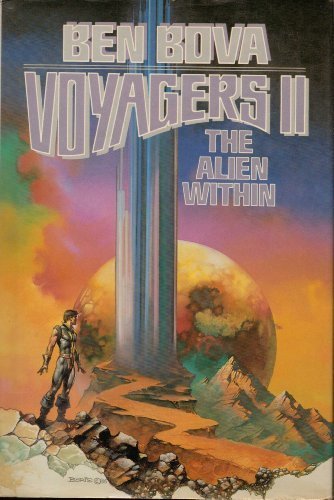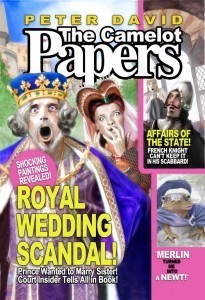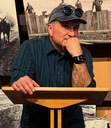Phil Giunta's Blog, page 112
November 28, 2011
Favorable Review!!
While finishing revisions on my next book, I received via email this praising review of my paranormal mystery novel, Testing the Prisoner, from actor/writer David Orange.
"Phil Giunta has written a haunting psychological page-turning thriller with deeply etched three-dimensional characters that keeps you riveted as to how the protagonist is going to get out of the mess he's in, if at all. After finishing the last page, I feel I know him extremely [well] and also the characters impacting his life, but also at the same time afraid to look into the mirror, fearful that I may be the next victim."
---David Orange, actor and author of 'The Powder Merchant'
Not too shabby! :)
November 23, 2011
About this Writing Stuff...
It's a hot one this week as Joe Konrath and Lee Goldberg throw Penguin under the bus for their new self-publishing service. We have two "How To's" from Jody Hedlund. Dean Wesley Smith ponders why anyone would need an agent while Crystal Patriarche offers advice on publicity prior to publication. Sophie Masson discusses writing a digital comic and speaking of NaNoWriMo, Anna Elliott shares her lessons learned. On the convention scene, Farpoint is just a few months away...
Book Country Fail by Joe Konrath
Sucker Country by Lee Goldberg
How to Build a Blog Following from the Ground Up by Jody Hedlund
How to Prolong Your Book's Exposure by Jody Hedlund
Why Would You Ever Need an Agent in this New World? by Dean Wesley Smith
5 Things to Know About Publicity Before You're Published by Crystal Patriarche
Writing a Digital Multimedia Comic by Sophie Masson
NaNoWriMo: Lessons Learned by Anna Elliott
Farpoint: SF/Fantasy/Horror Media Convention coming in February 2012!

November 21, 2011
The Great Allentown Comic Con - Day Two
Steve's oldest son, Ethan, made a few bucks selling on demand sketches of Star Wars and superhero characters. As for me, well, it's always nice when someone returns to your table 20 minutes after buying a copy of your book to tell you that she can't put it down (but had to in order to help at her son's art table).
With our guest table completely mine in the mid afternoon, I spent about an hour on second draft revisions to my second book and stole away for a few minutes to have Peter Mayhew autograph one last vintage Star Wars item for me, the Return of the Jedi Collector's Album (essentially, a magazine about the making of the film).
I packed it in around 3PM and assisted with setting up for the art auction to benefit Epilepsy Awareness Month. I then took some last minute pictures with veteran writers buddies Michael Jan Friedman and Peter David and friend and artist Laura Inglis (see below) before leaving the show.
As a side note, I also received an email invitation this weekend to return as a guest at BaltiCon over Memorial Day weekend next year. I'm looking forward to that but first, come February, I will also be an author guest at Farpoint !



November 20, 2011
The Great Allentown Comic Con-Day One
Actor guests include Robert Picardo (Star Trek Voyager, Stargate SG-1), Peter Mayhew (Chewbacca), David Orange (Star Trek VI) and voice actor Tom Kane (Yoda in the Star Wars: The Clone Wars animated series).
I had the pleasure of helping the convention bring in Peter David, Michael Jan Friedman, Robert Picardo, and friend/artist Laura Inglis who did the cover art to my next book coming out in 2012. After 20+ years of going to these shows, it was high time to put my contacts to good use for a show in my own town. :P
Attendance was higher than expected and everyone seemed to have a great time. The show got off to a slightly disorganized and rocky start but recovered quickly even before the throng of fans started pouring in. This was the convention's first two day show. They had done several one day shows over the past two years or more and they'd never brought in actors. So this was a leap for convention organizer Chris Wertz, and one that I truly hope will be a success. The Lehigh Valley needs more cons like this.
It's become a standard practice with me to give promo copies of novel to convention guests with no strings attached. I don't expect them to ever actually read it, let alone review it but David Orange was kind enough to offer to email a review to me with permission to quote him (provided it's a positive review!). He is also a screenwriter and we talked about writing and publishing and eBooks for a few minutes. David played a Klingon in Star Trek VI in the scene where Uhura spoke broken Klingon while trying to sneak the Enterprise past the Klingon outpost to rescue Kirk and McCoy. "Don't catch any bugs!"
Fellow Philadelphian Bob Picardo and I had a nice conversation about our old hometown. He grew up in Germantown and I in Roxborough. He actually insisted on giving me an autographed photo in exchange for my novel. I picked up a nice shot of him with Jeri Ryan cheek to cheek.
I also picked up a trading card set for the SyFy series, Warehouse 13 and splurged on three Peter Mayhew autographs on vintage Topps trading cards from the 70s and 80s that I had brought with me from home.
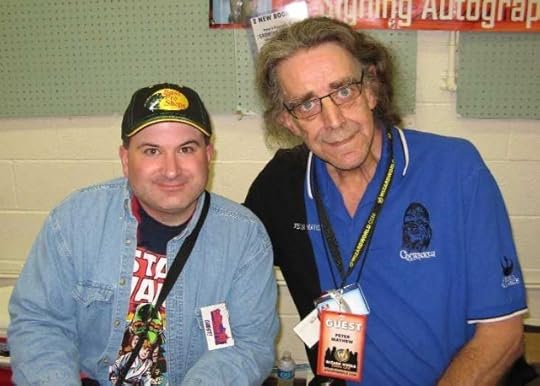
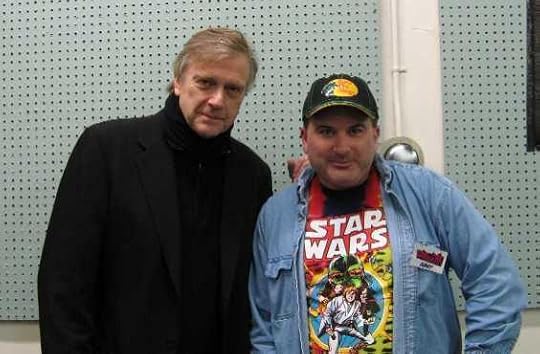

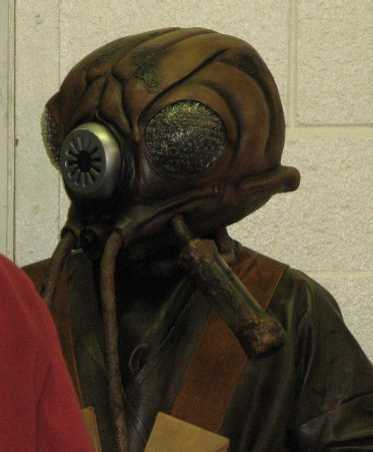
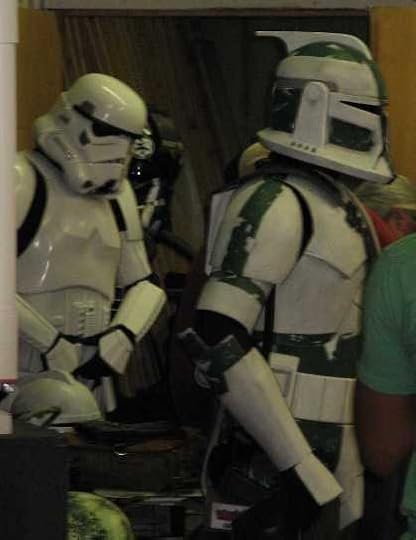
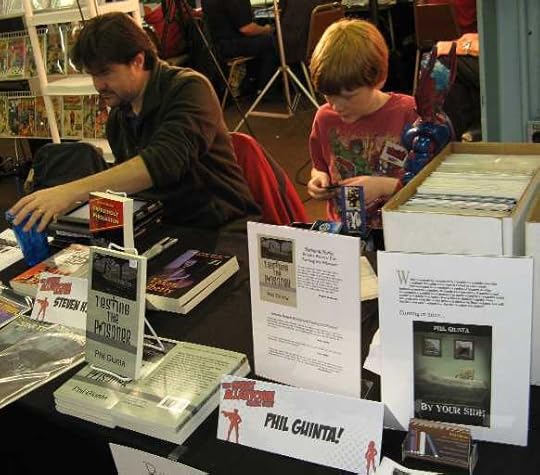
November 15, 2011
About this Writing Stuff...
Friend and veteran author, Michael Jan Friedman is preparing to Fight the Gods at the upcoming Allentown Comic Con this weekend!
What Makes a Story Feel Unrealistic? by Jami Gold
The Old Stone Path by Kristine Kathryn Rusch
Lee Goldberg’s Guest Post on Konrath’s Blog (and Konrath talks NUMBERS)
Fight the Gods by Michael Jan Friedman
The Rules for Fast Drafting by Candace Havens (via Jami Gold)
The Dean Wesley Smith Trio
Lee Goldberg and JA Konrath
Publisher Moves to POD
The New World of Publishing: 95% of All Authors Will Never Indie Publish
The Great Allentown Comic Con , November 19-20, 2011 at the Merchants Square Mall in Allentown, PA with tons of comic book and fiction writers and artists as well as actors Peter Mayhew (Chewbacca), Robert Picardo (Star Trek: Voyager, Stargate SG-1, Innerspace and more), Tom Kane (voice actor - Yoda in the Star Wars animated series). Friends Peter David, Michael Jan Friedman, Steven H. Wilson, and I will all be on hand as well and Michael will be premiering his latest release, Fight the Gods, mentioned above!
November 11, 2011
Book Review: Voyagers II - The Alien Within
Awakened after eighteen years in cryonic stasis aboard an alien spacecraft, astronaut Keith Stoner has returned to Earth. Yet both Stoner and his home planet have changed. The starship, now orbiting Earth, has provided several remarkable leaps in technology for the human race and as Stoner starts life anew, he finds some startling alterations within himself--he is now sharing his mind with that of the dead alien found aboard the ship nearly two decades ago. At the time, it had been Stoner's decision to leave behind all that he knew for a chance to explore the cosmos. Now, he finds himself becoming increasingly devoid of emotion in exchange for superhuman mental abilities and a relentless drive to change his corrupt and war torn world for the better.
Stoner flees captivity from Vanguard Corporation, the company responsible for reviving him. It's president, Jo Camerata, a former flame of Stoner's, assists in his escape knowing that her sadistic CEO husband Everett Nillson would take whatever measures necessary to extract every bit of alien intelligence from the astronaut. Yet even Jo cannot control Stoner as he eventually leaves her and reunites with old friends, makes new allies, and travels the world in an attempt to bring peace to war ravaged Africa and shut down a global terrorist organization known as the World Liberation Movement.
Ben Bova crafts a fast paced story with political and corporate intrigue and a central character that reminded me very much of Klaatu from The Day The Earth Stood Still. Well, Klaatu with some burgeoning Jedi abilities. :-) The other main characters are also fairly well developed although the focus is almost completely on Stoner. The story is not without some twists as some characters reveal their true colors and loyalties. The backdrop of bloody politics and corporate backstabbing of Stoner's Earth are among the few things that have not changed in his eighteen year absence and reflect the sad state of affairs in our own reality.
November 8, 2011
About This Writing Stuff...
Among the links this week, Annie Neugebauer offers up what seems like common sense advice on becoming a more confident writer (but you know what they say about common sense). Donald Maass talks about reversals of fortune in your fiction while Jami Gold discusses the concept of the "Fast Draft". Jody Hedlund ponders a writer's worst enemy and Brian Klems of Writer's Digest puts things in perspective for us...and Shelli Johnson does, too!
Be a More Confident Writer: 5 Choices that May Be Hurting Instead of Helping by Annie Neugebauer
Reversals by Donald Maass
Can You "Fast Draft"? by Jami Gold
A Writer's Number One Enemy by Jody Hedlund
How to Gain Perspective on Your Work by Brian A. Klems
What Rejection Can Teach You by Shelli Johnson
How I Got My Agent by Kevin Sheehan
November 6, 2011
Author Interview: Shelli Johnson
Shelli captured the Hearst National Journalism Award during her time with a major newspaper and with her first novel, took the Grand Prize in the Writer’s Digest International Self Published Book Awards.
With her second novel due out in 2012 and a third two years after, I think it’s safe to say that Shelli’s career as a fiction writer is off to an exemplary start.
First, tell us where we can find you online.
www.shellijohnson.comwww.shellijohnson.com/blogwww.facebook.com/shellijohnsonauthorwww.twitter.com/Shelli_Johnsonwww.goodreads.com/shellijohnsonwww.bookblogs.ning.com/profile/ShelliJohnson
What genres or authors do you enjoy reading?
Genres: I'll read just about anything. Favorite is probably horror. I am a zombie fan (World War Z by Max Brooks = phenomenal zombie novel). But I love literary stuff and fantasy. Anything beautifully written--that would be my favorite, some gorgeous language to go along with a great plot.
Authors: I've been a Stephen King junkie since I was 12. The Book Thief by Markus Zusak is a fantastic book. Any of Michael Crichton's early work, fast but engaging reads. I read Thirteen Reasons Why by Jay Asher not too long ago; that was a stunning book about suicide. That's some guys. So women: I love Geneen Roth, who actually writes non-fiction, but she's fabulous. I'll buy her stuff without even reading what it's about. Anne Lamott's Bird by Bird is probably the best book on writing that I've ever read. Okay, fiction ~ Dorothy Allison's Bastard Out of Carolina, Harper Lee's To Kill a Mockingbird, Alice Walker's The Color Purple.
Tell us a bit about your previous life as a journalist and how you captured the Hearst National Journalism Award.
I worked in the Sports Department of a major metropolitan newspaper for several years. I covered mainly high-school sports but every so often I would help out with some of the majors (golf, baseball). While I like sports ~ I’m a big football fan ~ being a hard-news journalist really wasn’t for me. The award was for a feature story I did for a different section of the newspaper. It was a first-person account about eating disorders ~ since I struggled with that for a long time when I was younger. It ended up being one of the most raw pieces I’ve ever written. It also ended up being the one that received the most reader feedback that section of the paper had ever gotten. Then it won the Hearst Award. The validation was nice as, quite frankly, I’d been terrified to put myself out there like that ~ the paper had a circulation of over a million.
What motivated you to write fiction? Were there any particular authors that influenced you?
I've always loved writing. The earliest memory I have of it is writing a story in the first grade & having it be selected by the teacher to be read to the Kindergarten class. I don't even remember what it was about. But I do remember thinking that writing was all I wanted to do. My favorite part of writing is when I get so caught up in the story that I lose track of time. There's nothing quite like the feeling of that for me; it keeps me coming back. Plus, I love my characters. I actually look forward to sitting down and seeing what they're going to do next.
Stephen King was the biggest influence in pushing me toward being a fiction writer. When I was a kid, my family & I went on vacation up to a cabin in Maine. There was no running water, no electricity ~ “roughing it like the settlers” my dad said. Not great, though, for a 12-year-old girl. Under one of the bunk beds, I found a box full of Stephen King books & I spent those 2 weeks reading his early work, which is absolutely fantastic. I wanted to be able to do what King did ~ make people feel scared, angry, happy, whatever ~ just by telling them a story.
What inspired your first novel, Small as a Mustard Seed (Ten Twenty Seven Books, May 2011)? How did you arrive at the decision to self publish?
I was writing about the main characters ~ sisters ~ for about 4 months, both of them as adult women. The story wasn’t really going anywhere, and then one morning (about 2 a.m.) one of them showed up as a 10-year-old in a barn, scared out of her mind, her father with a gun to his head & threatening to pull the trigger. That scene ended up being the first chapter of the book. Once I got that idea, the rest of the story just came along with it.
I chose to be an independent author early on, mostly because I got a substantial grant to do it. The Weisman Fund (the grant liaison, after reading only the first three chapters, believed in my novel so much that she fought for me to be awarded one of the grants) gave me money to start my own small press. I wanted to learn how to do it, so that’s the choice I made. Afterward, I did the whole query/agent/publisher thing for a while. I got some fantastic feedback ~ "this is a beautiful, beautiful book"; "A real page turner"; I didn't want it to end" ~ and ended up landing a top agent at a BIG New York literary agency. She tried to sell my book, and yet even with all the praise, she couldn’t. The editors ultimately passed. When it didn’t sell, she put it on the shelf & said we’d try again with my next book. Except that my agent didn’t think she could sell the book I was working on ~ the topic about World War II being the problem ~ and so she asked me to write something else. I spent 14 months working on that something else (a novel I wasn’t really passionate about) & about 600 pages of dreck later, I had nothing. The agent & I parted ways. I salvaged about 60 pages, added it to the World War II novel I had wanted to write to begin with, & kept on writing. That finished novel was good enough to get me an artist’s residency at Ragdale. I stayed indie after that because I found that it suited my personality and writing style much better.
Here's a brief description of Small as a Mustard Seed: As a child in 1960′s rural Ohio, Ann Marie Adler finds herself caught between her father, Frank, a veteran who survived the war in Korea but with devastating post-traumatic stress, and her mother, Adele, who is blindsided by the mental illness that accompanied him home. In a series of escalating dangerous episodes, Frank confuses reality with soul-searing memories, believing he’s still a soldier fighting for his life in battle-torn Korea. During the delusions, Ann Marie and her younger sister, Jolene, become the enemy, which leaves them fearing for their lives. Unable to fully protect her daughters, Adele scrambles to keep order while her husband’s threatening and unpredictable outbursts slowly tear the family apart.
And here's an excerpt: http://shellijohnson.com/excerpts/small-as-a-mustard-seed/
What can readers expect from you next?
The book I recently finished will be coming out in 2012. It’s still untitled as of yet. Here’s a brief description: When Rose Harlen struts into PJ’s Tavern in the scorching heat of an Illinois summer looking to cool herself off, she ends up discovering Danny, a charismatic man who alters the trajectory of her life forever. Instead of following her dream of acting on stage, Rose chooses the stability and comfort of marriage. But Danny has a life-changing secret. While Rose’s world careens toward catastrophe, Helena Basinski’s life in Poland radically changes when her husband’s activities in the Resistance trigger their family’s deportation by the Nazis to Buchenwald Concentration Camp. Helena is selected to serve in the camp’s brothel where one of the guards falls obsessively and dangerously in love with her. She survives the war but with memories that are bone deep and forever. Years later, after Rose’s world has been splintered and Helena’s shattered, the two women quietly but forcefully collide.
And you can read an excerpt here: http://shellijohnson.com/excerpts/unpublished-work-in-progress/
Currently, I’m writing my third novel. It’s about World War II from the point of view of a German soldier. I hope to have it out by 2014.
What does Shelli Johnson do when she isn’t writing?
I love reading, which probably goes without saying. I also enjoy cooking in my crock-pot (recipes up on my blog: http://shellijohnson.com/category/crock-pot-recipes/). I’m a runner so I do that three or four times a week. I also have two young boys, and they keep me busy. I'm married, so I hang out with my husband a lot. Plus, I work as a free-lance editor so I’m doing that around everything else.
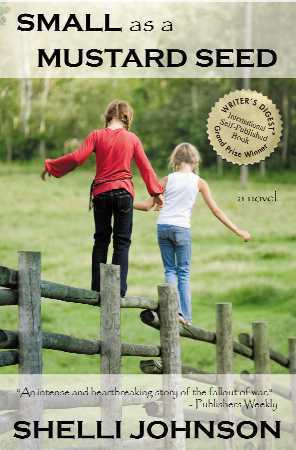
November 2, 2011
About this Writing Stuff...
Despite the mayhem, I am happy to be prompt with another round of hopefully helpful articles. It's an abbreviated edition due to the aforementioned disaster and inherent stress that comes with it. We have a hat trick of How To's this week, including two unique tactics for developing characters and a playful method of finding success in your writing. Jane Friedman discusses the responsibility shouldered by self pubbed writers and Bob Greenberger brings us A Matter of Faith, a published short piece in the SF genre.
How to Avoid Parenting Your Characters by Sue Bradford Edwards
How to Find Your Way to Writing Success? PLAY! by Barbara O'Neal
How to Use Psychometric Testing to Create Believable Characters by Vince McLeod
Self-Published Authors Have Great Power, But Are They Taking Great Responsibility? by Jane Friedman
" A Matter of Faith" is All You Need by Bob Greenberger
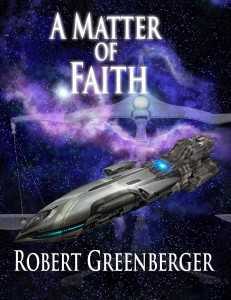
October 30, 2011
Book Review: Peter David's Camelot Papers
Vivianna is certainly a rare commodity in the days of Camelot--a literate woman. More, a literate woman sold into slavery by her father. Upon her arrival at Camelot, however, her life as mere chattel begins to take some amazing, compelling, and at times disturbing twists that allow her to rise to the status of the the queen's handmaiden.
Of course, the very fact that she can read and write immediately places her under suspicion from the other slaves, making her pariah even among the lowest class in society. She is quickly isolated and left very much alone, even accused of witchcraft. Along come a young prince and a sagacious apothecary who set Vivianna on a course that will broaden her world and elevate her station in life more than she ever thought possible. All the while, Vivianna chronicles her observations and wild encounters in her journal, revealing the "true" origins of the characters of Arthurian legend from Lancelot to Galahad, from Morgan the Fey and Modred, to Arthur and Guinevere, and of course the wizard himself, Merlin.
To summarize Camelot Papers is to reveal too many spoilers. Peter David presents a truly clever and inspired twist on the legend that we merely think we know so well. Oh, won't you be surprised! Although Camelot Papers is billed as satire, there is no lack of truly dramatic, suspenseful, and moving moments in Vivianna's experiences with the denizens of Camelot, be they servant or nobility. Every rumor is born from the slightest kernel of truth, and some rumors become legend. Peter David takes holds of this concept with the absolute authority and perspicacity of a master storyteller.

